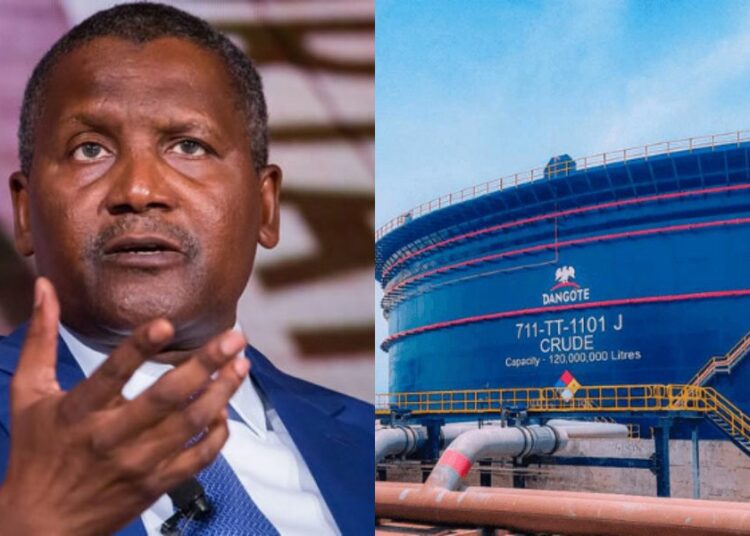The Dangote Refinery may end crude oil import as it considers sourcing the entire crude required for the 650,000-barrel-per-day refinery capacity in-country.
According to a Bloomberg report, the refinery will rely entirely on Nigerian crude oil by the end of 2025.
The refinery received about half of its crude in June from local producers who will be able to sell more to the facility as their foreign supply obligations end.
“We expect some of the long-term contracts will expire,” vice president at Dangote Industries, Devakumar Edwin said in an interview last week at the sprawling site. “Personally, and as a company, we expect that before the end of the year we can transition 100 per cent to local crude.”
Also, petrol imports by Nigeria declined to a record low in June, according to Kpler tracking data.
The report attributed the fall to rising output from the Dangote refinery which sharply reduced demand for the product from the EU, UK and Norway.
The drop in Nigerian buying pulled overall West African imports of European petrol to a four-month low of 926,000 tonnes, down from 1.315 million tonnes in May and 20 per cent lower year-on-year.
Dangote sold the idea of the massive plant as a way for Nigeria, the top oil producer on the continent, to stop sending barrels to Europe only to be refined and shipped back as costly imports — a process rife with corruption.
The gradual ramp-up of the refinery has already made Nigeria a net exporter of petroleum products, with room to go before reaching capacity. Still, the effort required large quantities of overseas crude after domestic traders failed to meet demand.
Nigeria has seen a withdrawal of oil majors from onshore and shallow water fields that have been taken over by local companies with fewer resources.
Meanwhile, supply contracts with foreign companies, crude theft and attacks on pipelines in the Niger Delta have curbed production reducing the availability of oil at home.
Since the Dangote facility opened, the company has bought crude from Brazil, Angola, Ghana and Equatorial Guinea, according to Edwin. Improved relations between the refinery, local oil traders and the government will result in a steady supply of Nigerian crude, he said.
That still requires a significant increase of local oil over the coming months.
In June, the refinery sourced 53 per cent of its crude supply from domestic producers and 47 per cent from the US, according to Bloomberg.
The plant is currently processing 550,000 barrels of crude a day, according to Edwin.
Dangote was scheduled to take five cargoes from Nigeria’s state oil company in July, the same amount that it’s due to take up in August, according to a list of cargo allocations. Each shipment holds almost a million barrels of crude.
Nigeria, long the region’s largest petro importer, slipped behind Togo last month as the Dangote refinery hit its highest monthly run rate since coming online.
The country is approaching a turning point in its petrol trade balance.
June arrivals into Nigeria from Europe fell by 56 per cent on the month to 231,000 tons— the lowest recorded by Kpler.
It also imported 28,000 tonnes from offshore Lome and 12,000t from Houston, leaving a total of 271,000t.
At the same time, Dangote loaded a record 252,000 tonnes of petrol for export last month.
This included 90,000 tonnes aboard the Pis Kerinci to Sohar, Oman; 89,000t on the Hafnia Larissa to Pasir Gudang, Malaysia; 35,000 tonnes on the Sabaek to Abidjan, Ivory Coast; and a further 39,000 tonnes aboard the Sabaek, which has yet to discharge.
The country could be on the verge of flipping to net exporter status, given the Dangote refinery has “extra plant capacity to produce gasoline”, according to Dangote Group executive director Edwin Devakumar. The plant’s naphtha hydrotreating unit has “flexibility to achieve additional production”, and Dangote has recently begun buying naphtha to support petrol output, he said.
The fall in Nigerian demand for petrol imports, combined with weaker-than-expected US consumption, is raising concerns over outlet options for European gasoline this summer, a European trader told Argus. Europe remains a large net exporter of the product.
Benchmark non-oxy gasoline barge cracks to front-month Ice Brent crude futures averaged $14.73/bl between 1–4 July, broadly steady on the year and slightly up from $14.62/bl in the same period of 2024.





